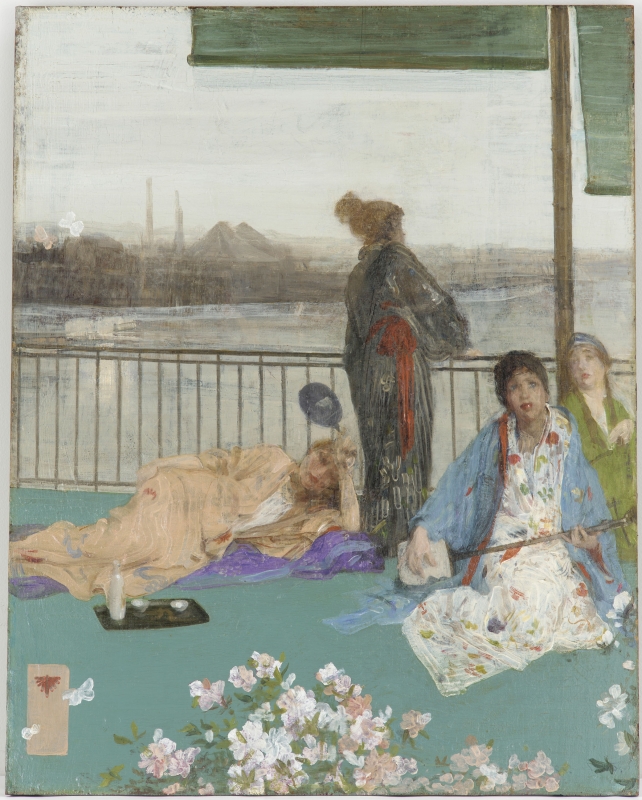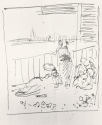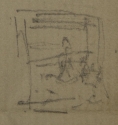Provenance
- Date unknown: sold by Whistler to George John Cavafy (1805-1891) , London;
- 1892: sold to Edward Guthrie Kennedy (1849-1932) of Wunderlich's, New York art dealer;
- 1892: bought from Kennedy by Charles Lang Freer (1856-1919) , Detroit, on 27 September 1892;
- 1919: bequeathed by C. L. Freer to the Freer Gallery of Art.
According to Whistler, he sold it to G. J. Cavafy for 30 guineas (£31.10.0), a price which suggests that it was sold in the mid-late 1870s:
'Look also at the matter of the little Balcony. I borrowed it several times ... and each time I worked upon it and added to its worth until at last I had more than quadrupled its value ... Now when you reflect that 30 guineas was the price paid and that I never since stayed my hand because of the sum, well, it is scarcely flattering to one's sense of appreciation.' 1
In July 1889 Whistler offered to buy it back for 100 guineas (£105.0.0).
'It was good of you to lend me "the Balcony." - I have however to been thinking that instead of continually asking for their loan I might perhaps try, by degrees, to buy back some of my early pictures little pictures - as they ... were all moderate in price -
Taking into consideration at the same time the possible increase in value I know I must give more than I received for them -
I therefore would propose to offer you £180. for the two pictures the Westminster Bridge, and the Balcony - I was paid thirty guineas apiece.' 2
John Cavafy (1839-1901) responded on his father's behalf, 'He desires me to inform you that he has no intention of selling the picture.' 3
In June 1892 Goupil's offered £500 for Cavafy's four paintings, The Last of Old Westminster [YMSM 039], Battersea Reach [YMSM 045], Variations in Flesh Colour and Green: The Balcony [YMSM 056], and Harmony in Blue and Silver: Trouville [YMSM 064]. Cavafy then asked for £600 down, but agreed to wait till 8 June for Goupil's decision. 4 Meanwhile, John Chandler Bancroft (1835-1901) of Boston offered John Cavafy £600 for the four paintings, but this was rejected, much to Bancroft's fury, in favour of £650 offered by E. G. Kennedy of H. Wunderlich & Co., New York. 5
A pen sketch, r.: Study of 'Variations in Flesh Colour and Green: The Balcony'; v.: Study of 'The Last of Old Westminster' and another painting [M.1339], reproduced below, was drawn to persuade E. G. Kennedy to buy these pictures. Out of the deal, Kennedy was to get three paintings, and return Harmony in Blue and Silver: Trouville [YMSM 064] to Whistler. 6 Once he had bought them, Kennedy had "The Balcony" sent to Paris for Beatrice Philip (Mrs E. W. Godwin, Mrs J. McN. Whistler) (1857-1896) to see before it was sent to New York. 7 It was bought from Kennedy by C. L. Freer on 27 September 1892 for $2900. 8
Exhibitions
- 1870: 102nd Exhibition of the Royal Academy of Arts, London, 1870 (cat. no. 468) as 'The Balcony'.
- 1873: [Exposition], Galerie Durand-Ruel, Paris, 1873 (press cutting, February 1873, GUW Whistler PC 1, pp. 61, 71).
- 1878: II Summer Exhibition, Grosvenor Gallery, London, 1878 (cat. no. 54) as 'Variations in Flesh-Colour and Green'.
- 1889: Exposition Universelle, Champs de Mars, Paris, 1889 (British section, cat. no. 166) as 'Le Balcon; – harmonie couleur chair et couleur verte'.
- 1892: Nocturnes, Marines & Chevalet Pieces, Goupil Gallery, London, 1892 (cat. no. 40) as 'Harmony in Flesh Colour and Green – The Balcony'.
- 1892: Retrospective Exhibition, Society of American Artists, New York, 1892 (cat. no. 358) as 'Variations in Flesh Color and Green – The Balcony'.
- 1897: Second Annual Exhibition, Carnegie Institute, Pittsburgh, 1897 (cat. no. 236) as 'The Balcony – Variations in flesh color and green'.
- 1901: Pan-American Exposition, Buffalo, 1901 (cat. no. 100) as 'Variations in Flesh Color and Green – The Balcony'.
- 1902: Rhode Island School of Design, Providence, 1902.
- 1903: Twenty-fifth Annual Exhibition, Society of American Artists, New York, 1903.
- 1904: Oil Paintings, Water Colors, Pastels and Drawings: Memorial Exhibition of the Works of Mr. J. McNeill Whistler, Copley Society, Boston, 1904 (cat. no. 57) as 'Variations in Flesh Color and Green – The Balcony'.
- 1905: Œuvres de James McNeill Whistler, Palais de l'Ecole des Beaux-Arts, Paris, 1905 (cat. no. 10) as 'Variations en couleur chair et en vert. Le Balcon - (Variations in Flesh Colour and Green. The Balcony).
1870: In The Graphic, on 25 June, it was described as 'a group of Japanese ladies on a balcony, overlooking a panorama of murky river scenery' and commended as 'a bouquet of colour, arranged by a master hand.' The London Evening Standard on 3 June balanced praise of Whistler's 'genius' with reference to a general opinion of his 'eccentricity', and categorised the painting as a Chinese scene painted 'in a masterly style that calls to mind the hurried sketches of the great Velasquez.'
It was more usually and reasonably associated with Japanese art, the Pall Mall Gazette on 20 May, for instance, writing, 'A still more uncompromising and single-minded painter of patterns rather than pictures is Mr. Whistler, whose brilliant and audacious little "Balcony" (468) shows us a group of women in Japanese dressing gowns and big chignons.' The Japanese influence brought negative comments in some circles. The Era on 8 May described it as 'a replica of one of the ordinary Japanese fans, price 6d. at the grocer's shop', though admitting its 'cleverness.' The Art Journal thought it 'singular and eccentric. The picture might have been painted in Japan. It affects to be Japanese in colour, composition, and handling.' 9 Similarly, when it was first exhibited in Paris a French critic wrote: 'Le désir d'atteindre à la franchise des estampes japonaises est flagrant ... C'est de la puérilité prétentieuse' (Translation: The desire to achieve the freedom of Japanese prints is obvious ... It is pretentious childishness). 10
1878: Frederick Wedmore (1844-1921) remembered it at the Grosvenor Gallery in 1878 as 'a quite delightful picture, suggested, indeed, by Japanese art, but itself not less subtle than the art which prompted it'. 11 The Times suggested a new title, ' "Chelsea China", as it represents ladies in celestial costumes on a balcony overlooking what looks like the Thames on a dirty day.' 12 This was fairly accurate in fact, but in context, dismissive.
1886-1887:
A pencil sketch, Six paintings [M.1328], showed Variations in Flesh Colour and Green: The Balcony included in a wish-list for a one-man exhibition at the Society of British Artists in 1886 or 1887. 13 The proposed exhibition was abandoned when Whistler was forced to resign from the Society.
1887-1889: Theodore Child (1846-1892), wrote in 1887 regarding Whistler's exhibits in France:
'Here in Paris we only know Whistler the etcher of the Thames and of Venice, and Whistler the painter of "The White Girl," exhibited in the Salon of 1863, of the Japanese fantasie "On The Balcony," of "At the Piano," and of the portraits of Miss Alexander, of Thomas Carlyle, and of the artist's mother - half a dozen works which are as near masterpieces as anything which this century has produced.' 14
In June 1888, and again in July and November, Child begged Whistler for a photograph of Variations in Flesh Colour and Green: The Balcony, to be engraved for an article on the Exposition Universelle of 1889, 'I wish you would be amiable yet a little while and send me over a photo for engraving of those girls on the balcony with flowers as you promised.' 15 Whistler agreed to having it engraved and the actual painting was finally sent to Paris for this purpose in December 1888. 16
Whistler thought the engraving 'beautiful' but asked Child to return the painting in order to placate the owner, 'Do send back the Balcony if it can now be spared - as the owner might in this way be softened towards me - and so be willing again to lend his pictures.' 17 In fact the owner agreed to lend it to the Exposition Universelle, and his son wrote, 'Pray let my father's "Balcony" picture be exhibited at the Paris International Exposition, since you wish it - But he feels, as we all do, that it is a little trying to be without the picture for so long - I am sure that you will return it to us as early as possible after closure of the Exposition.' 18 Whistler commented that, as a result, 'I have been thus enabled to show to the Art world in Paris what otherwise was lost in your rooms.' 19 And furthermore, Whistler was awarded a gold medal.
1892: Cavafy was at first unwilling to lend his pictures again, but eventually he agreed to lend Variations in Flesh Colour and Green: The Balcony to the Goupil retrospective, at which point Whistler immediately tried, but failed, to borrow it for Munich. 20 In the Goupil catalogue, Whistler mocked art critics, including Philip Gilbert Hamerton (1834-1894) and Frederick Wedmore (1844-1921) by judicious selections from their earlier reviews of Whistler's work. These included Hamerton's disparaging description of Whistler's 'eccentricities', and Wedmore's heavy-handed comment, 'A Variation in Flesh Colour and Green. The damsels ̶ they were not altogether meritorious. The draughtsmanship displayed in them was anything but "searching." ' 21 By such quotations, in the catalogue, Whistler emphasized his seriousness as an artist and his skills as a draughtsman and painter.
By late 1892 the painting was in the collection of Charles Lang Freer (1856-1919), and Beatrice Whistler wrote, 'We have heard from Mr Freer - He telegraphed asking if Harpers might reproduce the "Balcony"[.] We are very glad he has bought it - and hope you got the 1000 guineas, and that he will lend it to the Chicago Exposition.' 22
However, instead it went to the Society of American Artists exhibition in New York and unfortunately sustained some damage. 23
By the terms of C. L. Freer's bequest to the Freer Gallery of Art, the painting cannot be lent.
Notes:
1: Whistler to J. Cavafy, [July/October 1878], GUW #00549.
2: One of several drafts of a letter to J. Cavafy, [1/8 April 1889], GUW #00554; see also GUW #00555.
3: J. Cavafy to M. B. Huish, The Fine Art Society, 31 July 1889, GUW #00556.
4: Cavafy to Whistler, 7 June 1892, GUW #00783.
5: Whistler to Cavafy, [8 June 1892], GUW #00565; Cavafy to J. & R. McCracken, and to Bancroft, 10 June 1892, GUW #00562 and #00784; Bancroft to Whistler, 11 June 1892, GUW #00248. For the continuing reverberations of this sale, see Kennedy to Whistler, 2 December 1892, GUW #07207; Bancroft to Kennedy, 11 December 1892, GUW #00491 and #09844; G. & W. Webb to B. Whistler, 13 December 1892, and to Whistler, 17 December 1892, GUW #06172 and #09841; Whistler to Kennedy, 19 December 1892, GUW #07210 and #09828, and 15 February 1893, GUW #09704; and finally Bancroft to G. de Maurier, 11 November 1894, GUW #11556. See also Sieger, William, 'Whistler and John Chandler Bancroft', Burlington Magazine, vol. 136, October 1994, pp. 675-82.
6: Whistler to Kennedy, 10-11 June 1892, with drawings by Whistler after paintings, GUW #09680.
7: Kennedy to J. McN. Whistler, 25 July 1892, GUW #07198.
8: Freer Gallery Archives.
9: Art Journal June 1870 [more] .
10: [Exposition], Galerie Durand-Ruel, Paris, 1873; unidentified press cuttings, 1873, GUW Whistler PC 1, pp. 61, 71.
11: Wedmore 1879 [more] . According to one journalist, 'a balcony scene entitled "Variations in flesh colour and green" 'was one of the paintings exhibited at the Westminster Palace Hotel at the time of the Whistler-Ruskin trial in November 1878, as an example of works successfully exhibited at the Grosvenor Gallery in that year (The Globe, London, 25 November 1878; press cutting, GUW Whistler PC 2, pp. 28-29).
12: 'The Grosvenor Gallery,' The Times, London, 2 May 1878, p. 7.
13: [1886/1887], formerly dated [4/11 January 1892], GUW #06795.
14: Child to Edmund Yates, 19 January 1887, GUW #13182. Published in Ford 1890 [more] , pp. 154-55, under the title 'Butterfly Calumny'.
15: 30 June 1888, GUW #00615; see also GUW #00617.
16: Child to Whistler, 11 December 1888, GUW #00619; Child, Theodore, 'American Artists at the Paris Exhibition', Harper's New Monthly Magazine, vol. 79, September 1889, pp. 489-521, at pp. 492-94, engraving repr. p. 491.
17: [February/March 1889], and [1/2 March 1889], GUW #00622 and #09270.
18: J. Cavafy to Whistler, 14 March 1889, GUW #00551.
19: [31 March 1889], GUW #00552.
20: Cavafy to Whistler, 28 January 1892, GUW #00557; Whistler to D. C. Thomson, [1/8 April 1892], GUW #08210.
21: Nocturnes, Marines & Chevalet Pieces, Goupil Gallery, London, 1892 (cat. no. 40). Whistler did not quote the perfectly flattering comments published by Wedmore in 1879, which are quoted above.
22: B. Whistler to E. G. Kennedy, [22 October / November 1892], GUW #09793.
23: C. L. Freer wrote, 'the wood panel had checked considerably'; letter to Whistler, 9 January 1894, GUW #01506.
Last updated: 8th June 2021 by Margaret









